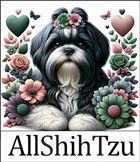Shih Tzu Feeding Guidelines
Sections on this Page:
Overview: An introduction to Shih Tzu Feeding Guidelines
Optimal Nutrition Schedule: Timing and Amounts for Shih Tzu puppies and adults
Aspects to Consider: Wet vs Dry Dog Food, Grain vs Grain Free and Key Elements of Quality Dog Food
The Best Food for Shih Tzu Puppies and Dogs: Exact recommended brands, both grain and grain-free
The Best Food for Seniors - Exact recommended brands for Shih Tzu adults age 8 and older.
Spotlight Food Articles: Includes: The Best Treats and Snacks for Shih Tzu Dogs, Help a Shih Tzu Gain Weight, Home Cooking, Picky Eaters and Supplements.
Overview
Please note: AllShihTzu is reader-supported, and some of the product suggestions on this page are affiliate links. As an Amazon Associate we earn from qualifying purchases. This is at no extra cost to you and helps keep this site running.
Optimal Nutrition Schedule
Timing: How many meals and snacks you give to your Shih Tzu depends on age:
Puppy, under 3 months old: Free-feed to prevent hypoglycemia. Keep fresh food available at all times. Avoid 'topping off' the bowl; instead, regularly clean it and add new kibble. Help your puppy locate its food and water dishes initially to encourage regular eating.
Puppies 3 to 12 months old: Shift to 3 meals per day. If away during the day, leave the mid-day meal for the puppy.
Adults: Opt for 2 to 3 meals per day. Toy breeds like the Shih Tzu shouldn't be limited to one meal a day; they need at least two, considering their small size and the potential for snacks and training treats throughout the day.
Amounts: How much food to feed a Shih Tzu varies based on food type (wet, dry, fresh, freeze-dried), quality (fillers vs. no fillers), activity level, health status, age, and metabolism.
For manufactured food, refer to the label's feeding guidelines, which are often based on weight. Remember, the serving sizes are usually per day, assuming several snacks are also given. As a general rule, the daily serving size is about 3/4 to 1 and 1/4 cups for each 10 pounds of body weight
Aspects to Consider
Wet vs Dry
Wet Food: While appealing to many dogs, wet food may not support dental health, can be pricier, isn't suitable for treat-release toys, and can lead to runny stools if it's the main component of a diet.
Dry Food: Beneficial for dental health, compatible with treat-dispensing toys, and easier on the stomach, leading to healthier stools.
For a balanced diet, dry kibble is generally preferable. To make dry food more appealing to a Shih Tzu puppy or dog that prefer wet food, consider adding low-sodium chicken broth, soaking kibble in warm water for 5-10 minutes, or warming the food. Mixing wet food into dry kibble is also an option; if so, use the same brand as your dry food and substitute 1/8 cup of kibble with 2 tablespoons of wet food per meal to maintain proper feeding ratios.
Grain vs Grain-free
Traditionally, grain-free diets were advised for dogs with grain intolerance or allergies, though sometimes gluten, not grains, is the issue.
Recent associations have been made between some grain-free dog foods and dilated cardiomyopathy (DCM), a canine heart disease. However, other studies suggest the actual link may be with a BEG diet (which stands for boutique, exotic and/or grain-free) with the issue possibly being 'exotic meats' (like alligator, kangaroo, bison, ostrich, and venison) alone or in combination with a grain-free recipe that has peas, lentils, other legume seeds, or potatoes as one of the top 5 ingredients.
If you are not sure if you should offer grain or grain-free, discuss this with your Shih Tzu's veterinarian. The answer often depends on factors such as any previous grain intolerance and health status. If given the okay for a diet without grains, it may be advisable to choose formulas that contain traditional meats such as chicken, lamb, turkey, duck, or fish (in other words, not part of a BEG diet as mentioned above).
To offer choices for both options, ahead you will see recommendations for some of the best foods that do have some grains that tend to be tolerated quite well (like brown rice and quinoa) and grain-free formulas for Shih Tzu with a proven history of high intolerance or allergies to any sort of grains.
Key Elements of Quality Dog Food
Poor-quality food can lead to issues like itching, digestive upset, behavioral problems, and even long-term health risks like cancer. Here's what to watch out for and what to look for in high-quality dog food:
Avoid:
- Fillers: Ingredients like corn bran and soybean mill run that offer no nutritional value.
- By-products: Low-quality meat parts unfit for human consumption, such as beaks and feet.
- Generic Meats: Unspecified meat sources, potentially including roadkill or diseased animals.
- Artificial Additives and Preservatives: Chemicals like Blue #2, Red #40, and MSG can cause skin and digestive issues, and potentially lead to long-term health problems.
- High Wheat Content and Gluten: Can lead to food intolerance and imbalance in protein and healthy fats.
- Meats Sourced Outside North America: Be cautious of foods labeled 'Made in the USA' but sourcing meats internationally.
Qualities of High-Quality Dog Food:
- Natural Ingredients: Human-grade meats, vegetables, fruits, whole grains (for non-grain-free diets), and healthy fats.
- Natural Preservatives: Such as mixed tocopherols, spearmint, rosemary, and green tea extract.
- Added Supplements: Omega-3 and 6, antioxidants, glucosamine, chondroitin, and probiotics for overall health and well-being.
- Proper Sizing for Small Breeds: Kibble size and shape suited for Shih Tzus to encourage eating and aid digestion.
- Easily Digestible Formula: Made with a small dog's digestive system in mind.
- North American Sourcing and Production: With exceptions for certain ingredients from countries with comparable safety standards.
Selecting the right food involves avoiding harmful ingredients and choosing those that support your Shih Tzu's health, with particular attention to their size and digestive needs.
The Best Food for Shih Tzu Puppies and Dogs
Please note: If you jumped down to this section but want to read the latest update regarding grain-free dog food, jump back a bit to 'What about grain-free?'.
The Best Food for Senior Shih Tzu Dogs - Age 8 and Up
- Joint health: Look for glucosamine and chondroitin for senior dogs.
- Digestive health: Ensure fiber and probiotics for regular digestion.
- Immune support: Choose a blend of vitamins and minerals.
- Skin and coat: Prioritize quality omegas to combat drying.
- Lower calorie content for reduced activity in senior dogs.
Spotlight Food Articles:

The Best Snacks and Treats for a Shih Tzu: Just as much thought should go into snacks and treats as it does for main meals. Details on this, including our top picks.

How to Help a Shih Tzu Lose Weight: If your Shih Tzu is a bit overweight, see our top tips for helping them lose the excess weight without compromising their happiness.

Home Cooking for a Shih Tzu: Covers why homemade food can be a good option in certain cases and leads to a PDF cookbook we are offering via GumRoad (our eBook delivery service).

Shih Tzu Picky Eaters: It's normal for a dog to prefer one flavor over another, but if things have gotten out of hand, see our detailed guide to address this issue.

Shih Tzu Supplements: Not all dogs require supplements. However, adults age 8 and up should have a daily joint supplement. Other supplements may be helpful for certain issues such as dry skin and coat issues.
Toxic Foods
- Grapes and Raisins: These can cause serious kidney damage and it does not take a large amount.
- Chocolate: Most people have heard that chocolate may not be good for a dog; the fact is that even a small amount can cause seizures, coma, and death to a small dog like the Shih Tzu.
- Onions: This can destroy a dog's red blood cells. Take caution with foods like pizza, pasta sauce, and meatloaf that may contain onions.
- Coffee, Tea, and Soda: Caffeine can cause seizures, coma and eventual death.
- Salt: While this is needed in small amounts, a large quantity of salt will cause kidney issues.
- Macadamia nuts: This expensive and sought-after nut can cause devastating reactions. The results of ingesting this can include muscle tremors and paralysis.
- Fruit pits and seeds: The fruit seeds and pits of many fruits including apricots, apples, and pears can cause a range of health issues including breathing difficulty, and/or fluids that fill up in a dog's abdomen and heart. Some fruit seeds can be fatal within 24 hours.
- Xylitol - This is an artificial sweetener that can be found in gum, candy, baked goods, and other foods.
Related Articles:
Top Fish-Based Treats for a Shih Tzu - The best ways to get more Omega-3 into your little one's diet. Read about the extraordinary benefits no dog should be without.
Healthiest Cheesy Treats for a Shih Tzu - Is your Shih Tzu a true cheese connoisseur or a doggo that wants to be, but struggles with dairy? Discover flavorful, tummy-friendly options, including one long-lasting lactose-free chew that’s safe to savor and loved by even the pickiest pups.
The Best Bowls for a Shih Tzu - Don't let the bowls be an afterthought. The right bowls will help with everything from preventing facial hair staining to easing stomach distress. Read more about this and see our top recommendations.
More Articles for You:
The Best Toys for a Shih Tzu - From durable chew toys for teething pups with itchy gums to companion toys for Shih Tzu that spend time home alone, this article covers all the best types of toys, along with recommendations.
10 Must-Haves Under 10 Buckaroos - On a budget but still want the best for your Shih Tzu? These clever care items are all easy on the wallet and big on everyday comfort, convenience and cuteness.
How Much Exercise Does a Shih Tzu Really Need - Shih Tzus may be lap dogs at heart, but they still need regular movement to stay healthy and happy. From daily walks to fun indoor play, here’s how to keep your pup active without overdoing it.
Seasonal Care Articles:
Shih Tzu Summer Care - When temperatures start to rise and summer's on the way, it's time to prepare your Shih Tzu. See our top tips for keeping your little guy or gal cool, comfortable and happy all summer long.
Shih Tzu Winter Care - When the daylight hours start to get short and temperatures are dropping, it's time to winterize your Shih Tzu. See our top tips for helping your little guy or gal stay warm, safe and happy all winter long.


